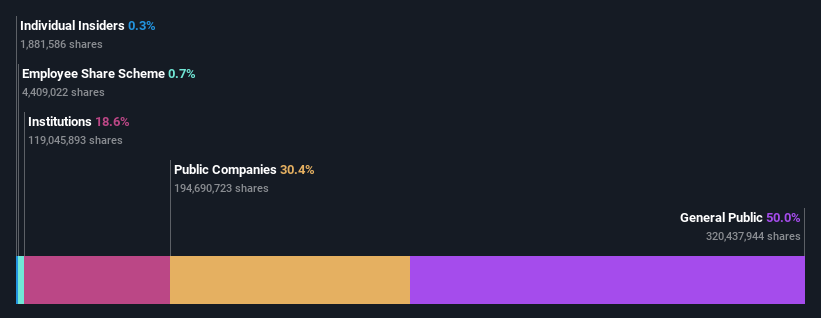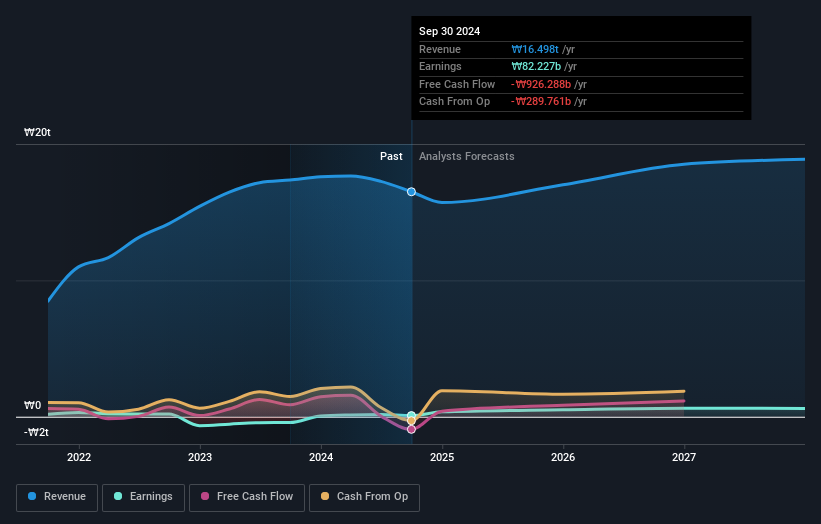- South Korea
- /
- Electrical
- /
- KOSE:A034020
Doosan Enerbility Co., Ltd.'s (KRX:034020) stock price dropped 4.0% last week; retail investors would not be happy

Key Insights
- Doosan Enerbility's significant retail investors ownership suggests that the key decisions are influenced by shareholders from the larger public
- 49% of the business is held by the top 25 shareholders
- Institutions own 19% of Doosan Enerbility
If you want to know who really controls Doosan Enerbility Co., Ltd. (KRX:034020), then you'll have to look at the makeup of its share registry. And the group that holds the biggest piece of the pie are retail investors with 50% ownership. That is, the group stands to benefit the most if the stock rises (or lose the most if there is a downturn).
And following last week's 4.0% decline in share price, retail investors suffered the most losses.
In the chart below, we zoom in on the different ownership groups of Doosan Enerbility.
See our latest analysis for Doosan Enerbility

What Does The Institutional Ownership Tell Us About Doosan Enerbility?
Institutions typically measure themselves against a benchmark when reporting to their own investors, so they often become more enthusiastic about a stock once it's included in a major index. We would expect most companies to have some institutions on the register, especially if they are growing.
As you can see, institutional investors have a fair amount of stake in Doosan Enerbility. This can indicate that the company has a certain degree of credibility in the investment community. However, it is best to be wary of relying on the supposed validation that comes with institutional investors. They too, get it wrong sometimes. If multiple institutions change their view on a stock at the same time, you could see the share price drop fast. It's therefore worth looking at Doosan Enerbility's earnings history below. Of course, the future is what really matters.

Hedge funds don't have many shares in Doosan Enerbility. Doosan Corporation is currently the company's largest shareholder with 30% of shares outstanding. In comparison, the second and third largest shareholders hold about 6.9% and 2.5% of the stock.
Our studies suggest that the top 25 shareholders collectively control less than half of the company's shares, meaning that the company's shares are widely disseminated and there is no dominant shareholder.
While it makes sense to study institutional ownership data for a company, it also makes sense to study analyst sentiments to know which way the wind is blowing. Quite a few analysts cover the stock, so you could look into forecast growth quite easily.
Insider Ownership Of Doosan Enerbility
The definition of an insider can differ slightly between different countries, but members of the board of directors always count. Company management run the business, but the CEO will answer to the board, even if he or she is a member of it.
I generally consider insider ownership to be a good thing. However, on some occasions it makes it more difficult for other shareholders to hold the board accountable for decisions.
Our data suggests that insiders own under 1% of Doosan Enerbility Co., Ltd. in their own names. It is a pretty big company, so it would be possible for board members to own a meaningful interest in the company, without owning much of a proportional interest. In this case, they own around ₩33b worth of shares (at current prices). Arguably, recent buying and selling is just as important to consider. You can click here to see if insiders have been buying or selling.
General Public Ownership
The general public -- including retail investors -- own 50% of Doosan Enerbility. With this amount of ownership, retail investors can collectively play a role in decisions that affect shareholder returns, such as dividend policies and the appointment of directors. They can also exercise the power to vote on acquisitions or mergers that may not improve profitability.
Public Company Ownership
We can see that public companies hold 30% of the Doosan Enerbility shares on issue. We can't be certain but it is quite possible this is a strategic stake. The businesses may be similar, or work together.
Next Steps:
It's always worth thinking about the different groups who own shares in a company. But to understand Doosan Enerbility better, we need to consider many other factors. Consider for instance, the ever-present spectre of investment risk. We've identified 1 warning sign with Doosan Enerbility , and understanding them should be part of your investment process.
If you would prefer discover what analysts are predicting in terms of future growth, do not miss this free report on analyst forecasts.
NB: Figures in this article are calculated using data from the last twelve months, which refer to the 12-month period ending on the last date of the month the financial statement is dated. This may not be consistent with full year annual report figures.
New: Manage All Your Stock Portfolios in One Place
We've created the ultimate portfolio companion for stock investors, and it's free.
• Connect an unlimited number of Portfolios and see your total in one currency
• Be alerted to new Warning Signs or Risks via email or mobile
• Track the Fair Value of your stocks
Have feedback on this article? Concerned about the content? Get in touch with us directly. Alternatively, email editorial-team (at) simplywallst.com.
This article by Simply Wall St is general in nature. We provide commentary based on historical data and analyst forecasts only using an unbiased methodology and our articles are not intended to be financial advice. It does not constitute a recommendation to buy or sell any stock, and does not take account of your objectives, or your financial situation. We aim to bring you long-term focused analysis driven by fundamental data. Note that our analysis may not factor in the latest price-sensitive company announcements or qualitative material. Simply Wall St has no position in any stocks mentioned.
About KOSE:A034020
Undervalued with excellent balance sheet.
Similar Companies
Market Insights
Community Narratives




